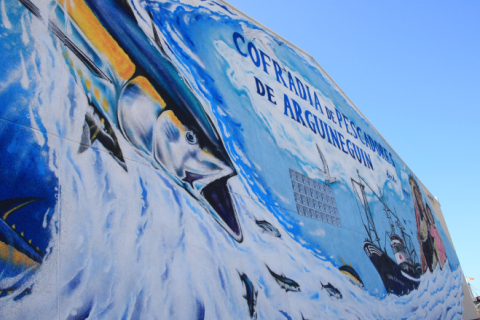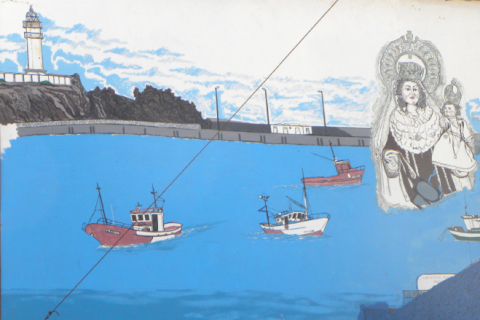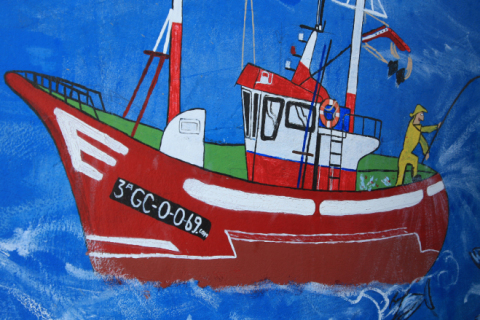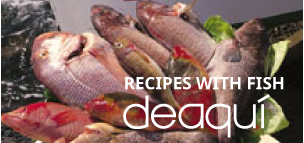The Guilds
Gran Canaria can not be understood without the classic picture of its boats defying the sea or its fishermen working exhaustively in their tasks once they moor at the harbour in fishing areas such as Agaete, San Cristobal, Taliarte, Castillo del Romeral, Arguineguin or Mogan.
This sector survives, chiefly, thanks to the work of associations, guilds and cooperatives set up by fishermen which guarantee the technical assistance to the industry, the interaction with the public offices and the safety and quality of the product, besides the improvement in marketing the fishery products. Not to forget the important social work carried out by its members, helping out fishermen and their families in difficult times.
The work of these entities and, in many cases, of the artisan fishermen individually, is as rarely known as valuable, for they not only try to defend their interests but also increase the value of their sea cultural heritage, dignifying their daily work.
Especially important is the work carried out by the guilds and cooperatives of Gran Canaria such as the authorized fish markets in which the professional fishermen can perform the first and compulsory sale of their catches, by issuing the initial first-sale form (this is called ‘passing the first-sale’) in a designated auction site. By issuing this initial first-sale form, the auction site will grant the documents stating compliance with the sanitary and marine legislation of the catch. Applying this first-sale rules in Gran Canaria consisted on a long and hard process to make see it accepted by the fishermen, plus training and increased workload for the administrative staff with the guilds and cooperatives. Eleven years later after the coming into force of these rules, though, Gran Canaria may be, possibly, the island with a higher rate of compliance for the first-sale rules. To consume fish which was first-sale authorities approved is a guarantee for environmental sustainability and food safety.
Although being a member to a Guild or a Cooperative is not a compulsory requirement for exercising fishing activities, the majority of the sea professionals are actually linked to this sort of entities because of the benefits such membership represents in the carrying out of the activity.
From a legal point of view, Guilds and Cooperatives are different entities and therefore different are their rights and duties, being their goals in regard of their members, the mediation in dealing with the public offices and the protection to their members similar.
There are 4 Fisherman Guilds in Gran Canaria: Agaete, Castillo del Romeral, Arguineguin and Mogan, and two Cooperatives: San Cristobal Fishing Cooperative (PESCATOBAL) and Melenara Fishing Cooperative
Some informati
Some information on the guilds and cooperatives in Gran Canaria
GuildCooperative |
NumberOfvessels |
NumberofShipowners |
NumberofSkippers |
NumberOfSailors |
PESCATOBAL SCL Cooperative |
16 |
14 |
16 |
43 |
Playa de Melenara Fishermen Cooperative |
17 |
16 |
20 |
52 |
C.P. Castillo del Romeral Fishermen Cooperative |
24 |
21 |
24 |
27 |
C.P. Arguineguín Fishermen Cooperative |
35 |
32 |
30 |
Variable, average of 60 (up to 200 during tuna season) |
C.P. de Playa de Mogán Fishermen Cooperative |
17 |
17 |
34 |
60 |
C.P. Agaete Fishermen Cooperative |
16 |
10 |
12 |
15 |
Adress
Sociedad cooperativa Limitada pescatobal: Explanada del refugio pesquero, s/n. Las Palmas. San Cristóbal
Playa de Melenara cooperativa de Pescadores. Muelle de Taliarte S/N. Melenara. Telde
C.P. Castillo del Romeral: Avda de la Playa s/n. Castillo del Romeral. San Bartolomé de Tirajana
C.P. Arguineguín: Avda. del Muelle s/n. Arguineguín.Mogán
C.P. Agaete: Pº Poetas S/N Puerto de las Nieves Agaete
The Crews
Each boat enrolls its own crew on a regular basis, depending the number of members on the minimum needed to operate each boat according to its size. Smaller boats, 6 to 9 metres, need between one and three crew members. Larger boats, on 10 to 12 metres and devoted to tuna fishing, require a minimum of six or seven crew members. Nevertheless, a large vessel can be crewed by two members depending on how skilled and coordinated they are, and as long as they are not fishing tuna.
Fisheries in the Canaries are accountable for the direct employment of around 1,700 people. It is estimated that each job in the sea generates three jobs onshore, so nowadays in the Canaries about 6,800 people and their families make a living on the sea.
Youngsters from families traditionally linked to the sea are willing to attain the experience that standardized qualification does not grant by passionately and vigorously committing to this profession, which is considered, beyond the economic gain, a way of life.
‘The sea must be learned from the cradle; it is an imitation process’
 /
/ 












